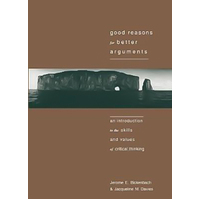Good Reasons for Better Arguments Paperback Book
An Introduction to the Skills and Values of Critical Thi
Good Reasons for Better Arguments: An Introduction to the Skills and Values of Critical Thinking
Author: Jacqueline M. Davies Dr. Jerome E. BickenbachPublisher: Broadview PressCategory: Language: Reference & General, History Of Western Philosophy, Philosophy: LogicBook Format: PaperbackThis text introduces university students to the philosophical ethos of critical thinking, as well as to the essential skills required to practice it. The authors believe that Critical Thinking should engage students with issues of broader philosophical interest while they develop their skills in reasoning and argumentation. The text is informed throughout by philosophical theory concerning argument and communication-from Aristotle's recognition of the importance of evaluating argument in terms of its purpose to Habermas's developing of the concept of communicative rationality. The authors' treatment of the topic is also sensitive to the importance of language and of situation in shaping arguments, and to the necessity in argument of some interplay between reason and emotion. Unlike many other texts in this area, then, Good Reasons for Better Arguments helps to explain both why argument is important and how the social role of argument plays an important part in determining what counts as a good argument.
If this text is distinctive in the extent to which it deals with the theory and the values of critical thinking, it is also noteworthy for the thorough grounding it provides in the skills of deductive and inductive reasoning; the authors present the reader with useful tools for the interpretation, evaluation and construction of arguments. A particular feature is the inclusion of a wide range of exercises, rich with examples that illuminate the practice of argument for the student. Many of the exercises are self testing, with answers provided at the back of the text; others are appropriate for in-class discussion and assignments.
Challenging yet accessible, Good Reasons for Better Arguments brings a fresh perspective to an essential subject.
Table Of Contents
Acknowledgements 1. CRITICAL THINKING: WHAT AND WHY What's in a Name? Critical Thinking and the Search for Good Reasons Who's to Say What a Good Reason Is? Good Reasons, Better Arguments and Rationality Rational Discourse: Giving Reasons Communicatively Rational Speech Acts, or Good Reasons for Better Arguments Communicative Norms: Expectations and Obligations Comprehensibility Sincerity Transparent Persuasion: The Goal of Better Arguments A Brief Overview of this Book Exercises 2. ARGUMENTS Critical Thinking Skills, Phase 1: Argument Structure and Construction The Argument: Form and Function Arguments and Non-arguments Arguments and Opinions Arguments, Explanations and Definitions Units of Meaning Standard Form for Simple Arguments Enthymemes and the Principle of Charity Standard Form for Complex Arguments Expressing Yourself in Argument Form Exercises 3. LANGUAGE Language as Context Definitions: Explaining Meaning Definitions: Arguing Meaning Paradigm Case/Counter-example Genus/Differentia Understanding Conditionals and the Relationship of Implication Language and the Gap between Intention and Communication Ambiguity Vagueness Euphemism and Hyperbole Jargon and Obfuscation Disempowering Language Linguistic Considerations in the Construction of Your Own Arguments Exercises 4. GOOD ARGUMENTS Phase 2: Evaluating Arguments Arguments, Arguers and Conclusions: Where to Start Your Evaluation Facts, Values and Opinions: Are They All Open to Evaluation? The Normativity of Argument Evaluation What Are Good Enough Arguments Good Enough For? General Criteria of Argument Evaluation Acceptability Relevance Sufficiency Cogency: The Overall Judgement A Few More Words on Expressing Yourself in Argument Form Exercises 5. BAD ARGUMENTS Fallacy-Spotting and Building a Better Argument Dubious Premises Premises that Mean Too Much, or Not Enough Premises Bearing Illicitly Imported Assumptions Irrelevance Irrelevant Attacks on the Source of Opinion Illegitimate Manipulation of Emotion Changing the Subject Improper Appeals to Authority Hasty Conclusions and Suppressed Evidence Building a Better Argument Exercises 6. DEDUCTION Three Modes of Argumentation Aspects of Deductive Reasoning Validity Categorical Logic Translation Venn Diagrams Immediate Inferences Syllogisms Fallacies of Distribution and Other Violations of the Rules for Syllogisms Propositional Logic The Strengths and Weaknesses of Deduction Exercises 7. INDUCTION Induction and Reasoning from Observation Enumerative Induction Representative Sampling and Justified Confidence in Induction Reasoning about Causation Types of Causes Inductive Justification and Scientific Methods Exercises 8. PRACTICAL REASONING The Scope of Practical Reasoning Intersubjectivity, Open-endedness and Criterial Reasoning Conductive Reasoning Reasoning from Analogy Communicative Rationality: The Sufficiency Criterion in Practical Reasoning Exercises Answers to Selected Exercises Appendix A: Procedure for Standardizing Complex Arguments Appendix B: Procedure for Expressing Yourself in Argument Form IndexAbout Jerome Bickenbach
Jerome E. Bickenbach and Jacqueline M. Davies both teach in the Department of Philosophy at Queen's University. Previous publications include Professor Bickenbach's Canadian Cases in the Philosophy of Law (Broadview, 3/e 1998)| SKU | BK-9781551110592 |
| Barcode # | 9781551110592 |
| Brand | Broadview Press |
| Artist / Author | Jacqueline M. Davies Dr. Jerome E. Bickenbach |
| Shipping Weight | 0.5900kg |
| Shipping Width | 0.160m |
| Shipping Height | 0.020m |
| Shipping Length | 0.230m |
| Assembled Length | 22.600m |
| Assembled Height | 2.300m |
| Assembled Width | 16.300m |
| Type | Paperback |




